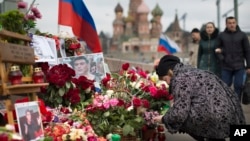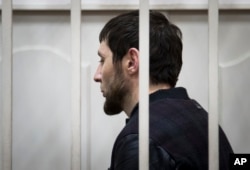Hundreds of people gathered Tuesday at the exact spot on Moscow's Bolshoi Moskvoretsky bridge where opposition politician Boris Nemtsov assassinated 40 days ago.
The timing of the commemoration of Nemtsov, who also held the post of first deputy prime minister, is in keeping with Russian Orthodox tradition.
So far, five men from Russia's restive North Caucasus have been arrested. All have denied involvement in Nemtsov's assassination.
Prime suspect Zaur Dadayev, has recanted an earlier confession, saying he did so only to secure the release of another suspect.
Among those who attended Tuesday's memorial was Nemtsov's close colleague Ilya Yashin, a member of RPR-Parnas, the opposition party Nemtsov co-led.
VOA's Russian service spoke with Yashin and asked him about the state of the probe.
Ilya Yashin: "The investigation, in my opinion, has hit a dead end. Despite the initial success of the investigation and the detention [of suspects], it appears that the investigation is clearly unable to establish the real perpetrators of the crime, to disentangle the chain of suspects. For this, there is neither the political will nor the resources. And they were even unable to detain and interrogate an associate of Dadayev's, named Ruslan Geremeyev.
"Suspicions regarding [Geremeyev] are more than obvious: he took a flight with Dadayev [from Chechnya to Moscow] shortly before the murder of Nemtsov; they lived in the same [Moscow] apartment, they served together - and it is simply necessary to, at minimum, carry out investigative actions in relation to him. But the investigation cannot do that, because Ramzan Kadyrov is protecting him. And Kadyrov, in turn, is being protected by [Russian President Vladimir] Putin. And it is obvious to me that as long as Putin is in the Kremlin, it cannot be expected that the real organizers of Nemtsov’s murder will be arrested."
VOA: But are there any prerequisites at least to ensure that those people who have already been arrested will be punished?
IY: Yes, those people who are detained will, to all appearances, incur the main punishment, despite the fact that they were nothing more than the perpetrators [not those who ordered the killing]. They will most likely ultimately be made the fall guys, but the key problem is that if those who ordered the murder remain at large while Putin is still in power, then the practice of political assassinations will continue. Because the people who ordered Nemtsov’s murder will be convinced that anything goes, and of their own impunity."
VOA: After the death of Boris Nemtsov, opposition figures who had fought or disagreed began to meet and negotiate. Has anything come of out of these talks?
IY: "Indeed, in the last few weeks there have been very intensive consultations between opposition politicians of the democratic wing. And in many ways, these negotiations, consultations, were made possible because, against the backdrop of the tragedy that occurred here on the Bolshoi Moskvoretsky Bridge, we all realized the insignificance of the contradictions between us, the insignificance of the fight of ambitions that took place during these years.
"Nemtsov often joked that the competition between the opposition leaders is a competition for places in prisons, for seats on the paddy wagons. As shown, it was a competition for who gets shot first. And if the opposition is not consolidated; if the opposition is unable, finally, to work together; then, in the end, all of us will be killed, imprisoned, or, at best, expelled from the country. Therefore, the consolidation of the opposition is a necessary condition for pulling the country out of the swamp into which it, unfortunately, is sinking deeper and deeper."






